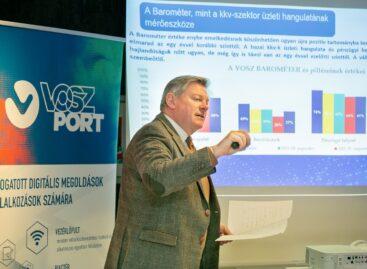Gardeners might be the winners of the decade
Food will be a strategic commodity in the future, with a permanently high price. As the rise in prices is not expected to stop, overall demand is expected to be reduced, though demand for fresh products is increasing. According to experts of Kopint-Tárki Zrt and Agrár Európa tanácsadó kft, agricultural production is expected to increase in Hungary by 10-15 per cent, while added value might increase by as much as 15-20 per cent. The EUR 1,6 billion surplus generated by agricultural export in 2007 is regarded as a great success. The balance is expected to deteriorate by at least EUR 600 million in 2008, even if production continues to grow, as the result of 2007 was mainly due to selling the intervention stocks of maize, which cannot be repeated. This year’s expansion in agricultural production will boost GDP by 1 per cent. While the share of relatively cheaper products in export is increasing, the same is true for products representing higher added value in import. The major fluctuations in agricultural production owing to the weather are a sign of the vulnerability of Hungarian agriculture. Investment in agriculture was down to less than two-thirds of the 2003 level last year. Investment is primarily dependent on the availability of subsidies, which means that a boom is expected in 2008. This will not only have an effect on agricultural machinery, but also on food processing, the production of fruits and vegetables and irrigation. Gardeners and enterprises preserving fresh products are expected to profit most from new projects in the near future. Agricultural subsidies showed more than a 100 per cent increase in the 2000-2005 period, which helped to improve the position of farmers, and also to conserve structural problems. New EU projects will not solve the problem of overall modernisation. Behind the positive results of 2007, a great diversity of incomes can be seen. While producers of corn, sunflower and milk achieved high profits, fruit producers for example recorded great losses. The increase in plant prices accounted for the largest part of the rise in agricultural prices in 2007. Gardening is regarded as the sector with probably the best prospects for the future. Subsidies are abundant and the sector is adapting well to the new trend favouring fresh products. The objective of reform is to improve the competitiveness of the sector, to promote consumption of fresh products (by for example distributing vegetables and fruits free of charge in schools), to give ecological considerations more attention than in the past, and to provide a wider range of tools for handling market crises. The reforms of 2008 are not expected to have a major overall effect on the Hungarian fruit sector. However, a total of HUF 100 billion is to be invested into modernisation of the sector till 2013. On the other hand, Hungarian agriculture cannot benefit much from the radical increase in demand which is taking place in China, Russia and America, as these markets are too far away.
Related news
Related news
Waves in the company trend – the changing faces of liquidations and company formations
Even with decreasing terminations, decreasing numbers of companies in the…
Read more >IGD: Retail media and increased efficiency will be important in 2024
This article sets out to summarise the retail trend predictions…
Read more >Domestic businesses are planning cautiously but consciously – VOSZ Barometer business sentiment analysis – Q1 2024
Uncertainty is still strongly felt in the business mood of…
Read more >



